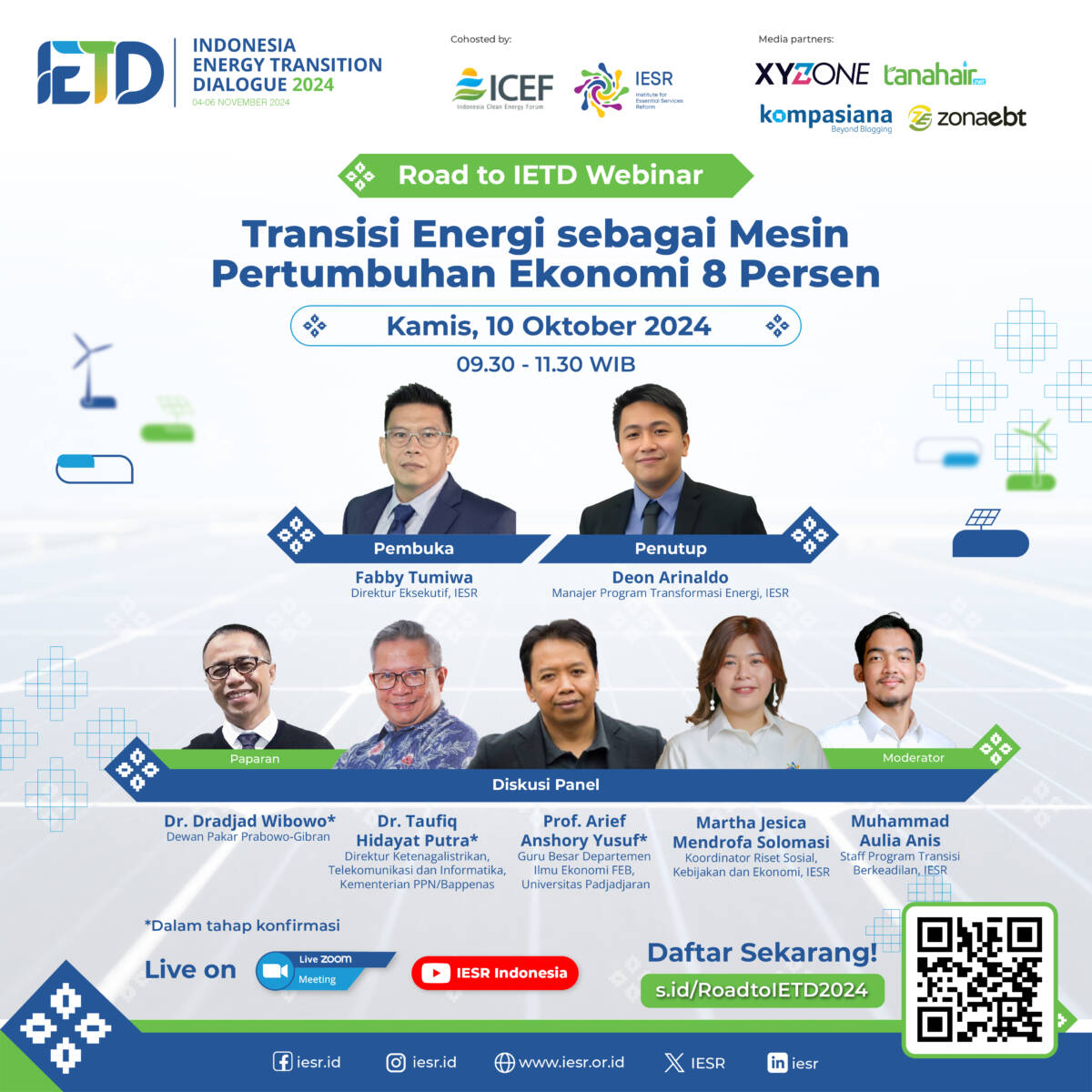
Road to IETD Webinar: Energy Transition as an Engine for 8 Percent Economic Growth
Background
Indonesia has committed to achieve Net Zero Emission in 2060 or earlier. This commitment is outlined in the Enhanced Nationally Determined Contribution (ENDC) where the national greenhouse gas emission reduction is targeted to decrease by 31.89% without international assistance and 43.2% with international assistance. However, Indonesia’s ENDC is still far from the emission reduction needed to limit the global average temperature rise below 1.5°C.
Indonesia’s economic growth since 2013 has been relatively stable at 3.70 – 5.56% until 2022. In the second quarter of 2024, Indonesia’s economic growth (5.11%) compared to regional countries ranked fourth behind Vietnam (6.9%) Philippines (6.3%) and Malaysia (5.9). Although positive, Indonesia’s economic growth is stagnant and less aggressive than other countries. This indicates the need for strategies to encourage other sectors to boost the national economy, one of which is the development of renewable energy projects that have broad implications for the domestic supply chain manufacturing industry.
The International Energy Agency (IEA) report in 2023 shows that the energy transition can contribute to increasing national economic growth, such as the energy transition in the United States which contributes 6% of GDP. Meanwhile, China’s energy transition contributed one-fifth of the 5.2% GDP growth, and India’s energy transition contributed 5% of economic growth. Economic growth in the G20 countries is supported by massive domestic policies on renewable energy project development, renewable energy supply chain manufacturing, and electric vehicle adoption policies.
With the potential for abundant renewable energy resources and varied types of technology, Indonesia should be able to become a renewable energy leader in the region. From MEMR data, the technical potential (in terms of technical feasibility and land availability) of renewable energy reaches 3686 GW, of which the largest potential of solar power plant reaches 3295 GW, followed by onshore power plant 155 GW, hydroelectric power plant 95 GW, biomass power plant 57 GW, hydroelectric power plant 60 GW and geothermal power plant 24 GW.
Indonesia is now entering a new leadership with the election of Mr. Prabowo Subianto and Mr. Gibran Rakabuming Raka as President and Vice President in 2024. According to Drajad Wibowo as the Expert Council of Prabowo Gibran TKN, 8% economic growth will be supported by industries, one of which is the downstream industry and household consumption through free lunches. Looking at the context of energy transition in national downstreaming, Indonesia is currently still experiencing limitations in the renewable energy manufacturing industry which results in the dominance of imported renewable energy technology products such as solar PV, wind turbines, inverters and batteries. Whereas the localization of the renewable energy industry is projected to be able to reduce the cost of renewable energy projects which has implications for the selling price of domestic electric products or electric vehicles and in a multiplier effect increases people’s purchasing power.
International funding options are also available with the commitment of the Just Energy Transition Partnership (JETP) and the Energy Transition Mechanism (ETM) to fund renewable energy projects in Indonesia. In addition to international assistance, interest from private and public developers (in rooftop solar PV development) is also increasing. However, some immature energy transition regulations and policies make the path of energy transition more difficult and need to be integrated in inter-ministerial development planning documents.
The energy sector is one of the focuses mentioned in Prabowo-Gibran’s vision and mission for the 2024 election. With the aim of making Indonesia the World Energy King, national energy security will be carried out through the development of biodiesel and bio-avtur products from palm oil, bioethanol from sugar cane and cassava, as well as other green energy from wind, solar and geothermal. Some of Prabowo-Gibran’s strategies in the vision and mission document to achieve energy self-sufficiency are to reduce fossil energy dependence, improve renewable energy incentive schemes, revise governance that hinders new and renewable energy investment.
For this reason, it is interesting to understand the energy transition strategy further, amidst fossil energy dependence and the contribution of coal in the national economy. The Road to IETD Webinar discussion was held in preparation for the Indonesia Energy Transition Dialogue 2024 which will go deeper into how Indonesia can achieve a just and orderly energy transition. This discussion is important to see how the scenario in encouraging the contribution of energy transition in achieving the planned development targets.
Event Objective
- Discuss renewable energy development strategies in Indonesia’s development
- Discuss the opportunities and challenges of renewable energy development to support the 8% growth target
- To promote a series of IETD 2024 activities
Presentation
Energy & Economic Growth – Ali Mundakir – Prabowo-Gibran Expert Council
Energi-Pertumbuhan-Ekonomi_Ali-Mundakir_Dewan-Pakar-Prabowo-GibranSpeakers
-
Taufiq Hidayat Putra Ph.D - Director of Electricity Telecommunications and Informatics Deputy for Facilities and Infrastructure
-
Fabby Tumiwa - Chief Executive Officer (CEO) - IESR
-
Deon Arinaldo - Manajer Program System Energy Transformation IESR
-
Erina Mursanti - Deputy Chief Executive Officer (CEO) - IESR
-
Dr. Dradjad Wibowo - Dewan Pakar Prabowo-Gibran
-
Dr. Alin Halimatussadiah - LPEM UI
-
Muhammad Aulia A - Staf Program Ekonomi Hijau - IESR

